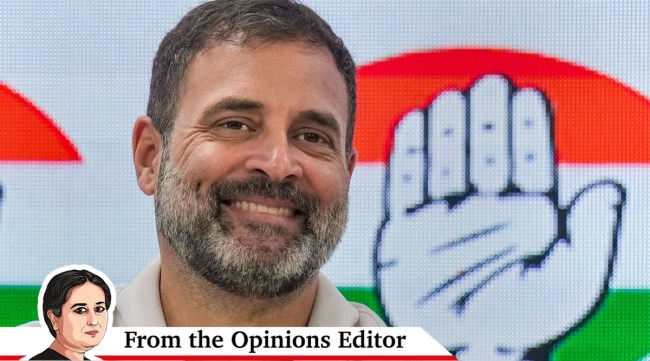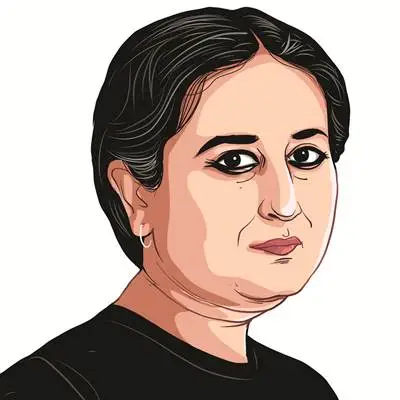Opinion Vandita Mishra writes: As Rahul Gandhi returns to the fray
His test will be to help shape the Opposition front's strategy to corner the government. And to keep from sagging the newly-minted Opposition unity. This dual role poses a challenge Rahul will need to step up to, perhaps by doing things a little differently
 Congress leader Rahul Gandhi at AICC headquarters during a press conference after the Supreme Court stayed his conviction in the 2019 criminal defamation case over his 'Modi surname' remark, restoring his status as an MP, in New Delhi, Friday, Aug. 4, 2023. (PTI)
Congress leader Rahul Gandhi at AICC headquarters during a press conference after the Supreme Court stayed his conviction in the 2019 criminal defamation case over his 'Modi surname' remark, restoring his status as an MP, in New Delhi, Friday, Aug. 4, 2023. (PTI) Dear Express Reader,
As Rahul Gandhi returns to Parliament and the electoral fray — now that the Supreme Court has stayed his conviction in the defamation case because of which he was disqualified from contesting elections and from the House — he comes back to a political arena arguably changed from the one he was forced out of. The question is: Is he keeping pace and changing too?
The no-confidence vote in the coming week is likely to bring into focus the many issues on the Opposition’s plate — it’s a fuller plate in August, at the end of the Monsoon session, than it was in the Budget session in March during which Gandhi was disqualified from Parliament.
Though the no-confidence motion has been moved in the backdrop of Manipur, where the crisis continues, the Opposition agenda also bristles with other urgent talking points.
Like the communal violence that convulsed Haryana’s Nuh district on July 31, spreading to the national capital’s doorstep. It was preceded by the abduction and murder of two men by cow vigilantes in Bhiwani in February. It has been followed by bulldozer justice, with the Haryana administration, taking a leaf from Yogi Adityanath’s book in UP, demolishing scores of houses and other structures in the immediate aftermath of the violence, bypassing due process and giving a free rein to state vindictiveness.
On the same day as violence flared in Nuh, a hate crime was committed on board the Jaipur-Mumbai Central Superfast Express, between Vapi and Vaitarna railway stations, about two hours from Mumbai. RPF constable Chetan Singh, 33, opened fire and killed a senior colleague and three passengers — after identifying the three from their (Muslim) names. A purported video captured his talk of “Pakistan… agar Hindustan mein rehana hai”.
The violence between communities in Nuh and the hate crime on the Mumbai-bound train are far apart — and yet related. It is the Opposition’s grim duty to connect the dots of hate. It must do this so that there is accountability, and for the possibility of justice and healing.
On the Opposition’s plate, too, is the Delhi services bill, passed in Lok Sabha, and likely to sail through Rajya Sabha, which replaces the ordinance the Centre pushed through in defiance of the Supreme Court verdict. The GNCTD Amendment Bill makes it possible for Delhi’s elected chief minister to be overruled by Centre-appointed bureaucrats. It overturns the principle and promise of representative governance, the accountability of bureaucrats to the elected government, and of the elected government to the people.
But even as the Delhi bill has become a symbol of Opposition unity, bringing arch-rivals AAP and Congress on the same side, strains are showing in the anti-BJP front that could now gather around the figure of Rahul Gandhi.
Quite simply, Opposition unity may have been easier to pull off with Rahul forced, by his disqualification, on the backseat. For regional parties, dealing with Congress is a fraught exercise anyway, beset with past resentments and present-day state-level rivalries. The Congress also contributes to the difficulties of forging jointness by its reluctance to let go of its self-image as the centrepiece of the long-buried Congress system. Now, a Gandhi again taking centrestage — Bharat Jodo Yatra, Karnataka victory and SC verdict under his belt — could make that relationship more thorny.
For Rahul, as the main leader of the largest party in the Opposition front, the test will, therefore, be two-fold — to help shape the strategy to corner the government, which will try to change the subject to the glitz of the mega G20 event. And two, to keep from sagging the newly-minted Opposition unity.
This dual role poses a tall challenge Rahul will need to step up to, perhaps by doing things a little differently.
Of course, it is not as if Rahul has stood still so far, it is not as if he has not shown a capacity for change.
In the long and arduous Bharat Jodo Yatra, he finally demonstrated a grit and staying power that had been missing in his political career. The installation of a non-Gandhi as party president also helped dent the charge of entitlement that is often made against him.
His visit to strife-torn Manipur, and his apparently impromptu appearances amid ordinary people — at the Azadpur wholesale market this week — have shown a leader making an effort to go to the people and talk to them in the places where they work and live.
These visits have shown, at least to some extent, that Rahul and the Congress don’t anymore confine themselves only to secular-vs-communal virtue-signalling, that they don’t cast the onus of defeating Modi entirely on the people. And that they recognise that an important part of their work is to reach out across the dividing lines, to the people in their several and intersecting spaces, to strike conversations on their multiple and overlapping issues.
And yet, there is work still to be done if Rahul has to, in the wake of Manipur and Nuh, help the Opposition front frame the deepening communal polarisation as an issue in a way that does not further polarise and alienate. And if he has to, at the same time, address the insecurities vis a vis the Congress of its smaller allies.
For the first, and for the second, what is needed, perhaps, is a little more listening, a little more humility.
It needs the recognition that while the issues may be etched starkly, and the dividing lines are sharp, an essential part of the leader’s task is not to give in to the dead-ends or submit to the blind alleys. It is to inch forward. By prising open, and enlarging, the spaces for a politics of possibility and persuasion — vis a vis allies and the people.
Till next week,
Vandita
Must Read Opinions from the week:
– Alok Rai, “No right to shame”, August 5
– Suchitra Balasubrahmanyan, “Mentor with a large heart”, August 5
– Sanjay Srivastava, “It happened in Gurgaon”, August 4




